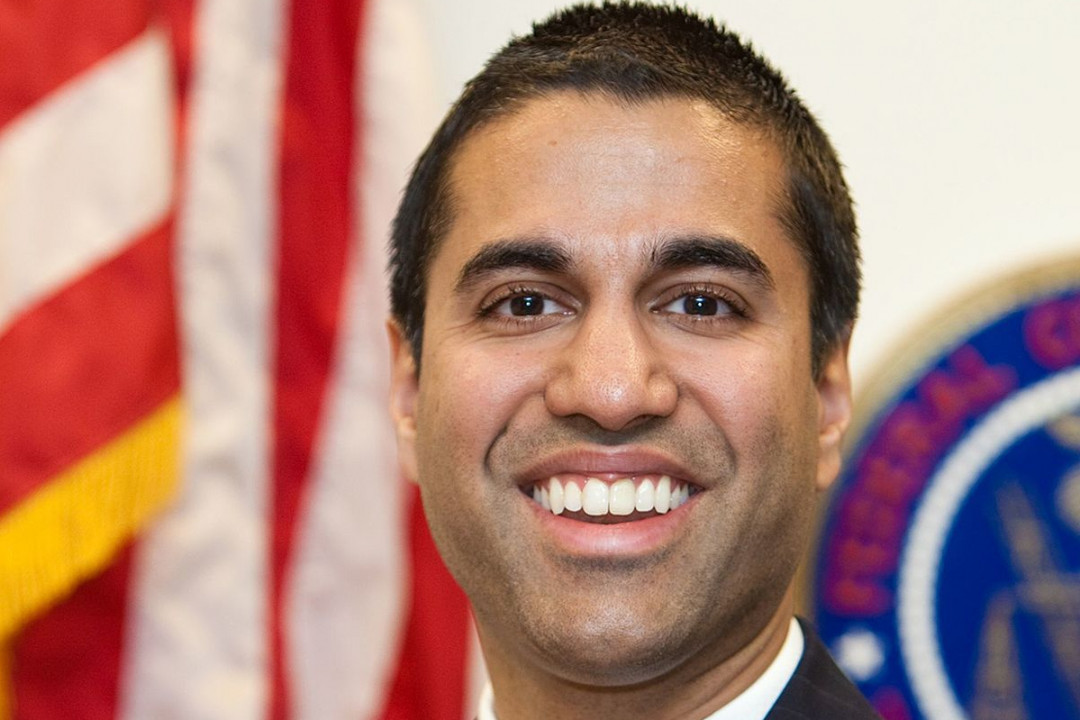Despite the fact that an overwhelmingly vast majority of Americans were against a repeal of Net Neutrality, mortal incarnation of "Smug," FCC Chairman Ajit Pai (and former associate general counsel for Verizon and class act who released a mean-spirited video making fun of people who opposed the repeal) lead the charge to repeal the regulation. As of June 11, Net Neutrality is no longer in effect.
What that means is that Internet Service providers may now deliberately speed up or slow down traffic from specific websites or apps and they can also put their own content at an advantage over rivals. No one knows exactly how net users will be affected and smaller entities, such as bands and independent labels, are especially concerned due to the fact that they don't have the spending power of larger entities to buy the favor of Internet Service Providers. To that end, Punknews staffer Mike Musilli spoke to some small bands and labels and gave his own thoughts on the issue. Check it out below.

How the End of Net Neutrality Affects Small Labels and Artists
Mike Musilli The repeal of net neutrality is one of a litany of legislative maneuvers undertaken by our current administration. The call to repeal, led by FCC chairman Ajit Pai, was yet another rallying point for many who oppose the administration’s policies. There were online petitions, protests, and articles written ad nauseam. Despite those efforts, on Monday, June 10th, 2018 net neutrality was repealed under the Restoring Internet Freedom Order.
In short, the Restoring Internet Freedom Order makes the internet a free-market commodity rather than a utility. Utilities are typically regulated by the government so as to make them efficient and accessible to as many people as possible. In terms of net neutrality, Title II regulation imposed a ‘level playing field’ approach for users and companies. Obviously, that isn’t the case for a free-market commodity. Pai argues that the repeal will help boost competition and improve market growth. Opponents argue the repeal will allow Internet Service Providers to essentially discriminate against certain companies while providing better service for others (the ‘fast lane’ vs. ‘slow lane’ argument). For example, a company that can pay more for internet service will have a clear advantage over a smaller company that can’t afford to pay up.
So what does this mean for music enthusiasts and musicians, especially those existing in the independent-minded underground? Apparently it means a lot for consumers, musicians and labels using small DIY platforms.
The effect seems most immediate for musicians in terms of the platforms they use to get their music out to the public. In an op-ed for Medium, Jesse von Doom, interim director at Mozilla and board chair at CASH Music, wrote, “So imagine for a second a musician sells their own digital music – on their website, on Bandcamp, wherever. iTunes is riding in that fast lane. Spotify? Probably. But Bandcamp? The musician’s website? They’re more like a rusty BMX pulling a three-wheeled Radio Flyer wagon over a cracked sidewalk.” The metaphor might seem a bit hyperbolic but the point here is that the repeal could mean painfully slow downloads for those who want to buy directly from the musician or other small digital music platforms. But if you want a nice speedy transaction, head right on over to iTunes.
For some this isn’t a huge deal. Maybe iTunes has always been your method for purchasing and Spotify your choice for streaming. Not much will change then. But for those who want a direct-to-artist transaction, for those artists who can’t necessarily afford (or don’t want) to buy their way onto iTunes or Spotify, or for those record labels without major resources, the repeal is consequential.
Cointoss Records owner Indy Powers is concerned for his DIY hardcore label that’s already swimming in a crowded and treacherous digital ocean. “I feel it will crush small companies,” says Powers. “I am already competing with so many other things, not just other record labels to get people’s attention. Social media is the best/fastest way for me to get information out to people. To charge extra per website, people might not take the time to seek out new music/bands/labels which would make me selling records and promoting my bands nearly impossible.” For Powers, it’s as much about music as it is about promotion. Cointoss Records is already engaged in a fight to set itself apart from the myriad other labels trying to promote their music and bands. The repeal only deepens Indy’s concerns because there is now a real possibility that, based on charges and connectivity, people may not even visit his sites.
Interestingly, some of the online providers that help artists get their music on the big platforms are speaking out against the repeal. In a feature for DIY Musician, CD Baby’s development manager, Robert F.P. Ludwick, explained that “artists may end up forced to distribute their music with certain services if those services are given preferential treatment by ISPs.” The problem here is one of choice, or the lack thereof. Ludiwck offers the example that “if Apple pays Comcast a fee to make Apple Music Comcast’s ‘official’ music streaming service, to the detriment of Spotify and others, then artists will likely need to make sure they distribute to Apple Music as well in order to maximize the chance of their music being heard.” What’s so striking here is that Ludwick works for a company that provides services to musicians that gets them on Apple and Spotify. Ludwick, it seems, is more struck by the un-leveling of the playing field that the repeal creates rather than by the for-profit opportunities the repeal offers for CD Baby.
Blind Justice frontman Mike Botti sees the repeal as just another example of political posturing. “I think the whole repeal is kind of ridiculous but it’s expected. Government needs to have their hands on everything,” says Botti. From his perspective, Botti sees this as another turning point in the evolution of music and the internet. “Right now I don’t think it’ll affect people so directly with music except maybe competing streaming outlets like Spotify or Apply Music. But this is just the beginning of what they might try and control next,” Botti offers. To be clear, he’s got stakes in both worlds. As an independent musician and a techie by trade, Botti views this from a far more macroscopic perspective. “Who knows what’s next – they could try and regulate what can and cannot be released,” Botti adds. For him, the repeal and its possible consequences are about control.
FCC chair Ajit Pai recently took to CNET to voice his position. Pai, the architect of the repeal, wrote that “under the Federal Communications Commission’s Restoring Internet Freedom Order…the internet will be just such an open platform. Our framework will protect consumers and promote better, faster internet access and more competition.” Pai draws most clearly on the ideas of competition and transparency in championing the repeal. For him, the Obama administration’s decision to regulate ISPs as utility services under Title II was simply the wrong move. Pai sees the repeal as a protection for consumers and businesspeople since part of the order requires ISPs to make their network management practices public, apparently allowing “consumers to make an informed decision about which internet service provider is best for them and give entrepreneurs the information they need as they developed new products and service.” How effective that will be for individuals, small DIY labels, and artists is still a very real question.
It's simply too early to tell how much the Restoring Internet Freedom Order will affect musicians, underground or otherwise. As seems to be the case in our world these days, the topic is polarizing and rife with partisan bias. To hear it from Mozilla’s von Doom, “without Title II net neutrality the web is just a battle of media titans with musicians caught in the crossfire. Artists who don’t sign everything over to big labels or plan to sell only through the biggest outlets will be hurt. The independent music world will be fundamentally changed.” Pai certainly doesn’t quite see it that way. But there should be concern for labels like Cointoss and independent bands, many of whom don’t have the capital to compete with media giants.
Frankly, with the repeal and its effects so nebulous, all we can really do is continue what we’ve always done. Make it our priority to support the independent businesses entrenched in our underground. Support musicians directly. Buy from label websites first. It’s preserving the DIY ethic and diligence so closely associated with punk and hardcore that’s most important. The big streaming websites and media companies will survive no matter what. And that’s just fine. Let us make sure that the independent musicians and labels survive as well. 
